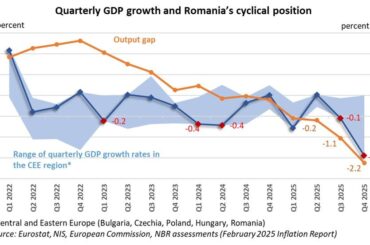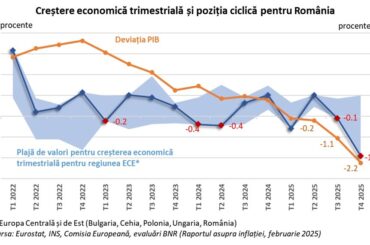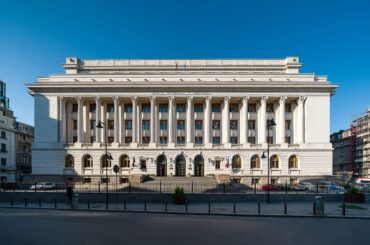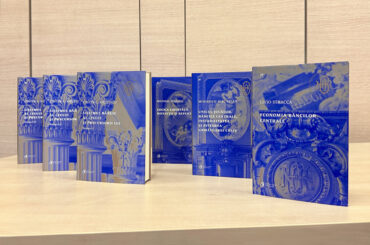DezeDebates on artificial intelligence (AI) have intensified greatly in recent years. The British government organized a high-level conference on this topic recently. Top officials from the EU and the USA consider AI among their priority policy orientations. Prominent Silicon Valley voices, major companies, are actively engaged in this debate. In Asia, AI is at the forefront of attention. At last year’s annual meeting of the Academia Europaea, Professor Helga Nowotny’s inaugural address and other lectures focused on AI. While the benefits of AI are widely acknowledged, deep concerns about its potentially harmful effects and the possibility of it spiraling out of control are also raised. Can AI be regulated without stifling innovation? Could AI address imbalances between needs and resources sustainably by bringing about abundance for all? This debate is particularly relevant given the significant disruptions of recent years, that have perturbed people’s lives and have led to a “cost of living” crisis with political ramifications.
I
Is it justified to speak about an abundance of goods and services in society? This question is to be judged given that, in the traditional sense, economics examines the dynamics of needs (both individual and collective) in relation to available resources. Markets regulate the relationship between demand and supply of goods and services through “equilibrium prices” – which are influenced by imbalances that depend on business cycles, shocks that disrupt supply chains, and policies that foster unsustainable consumption. However, “equilibrium prices” can conceal significant disparities in incomes, purchasing power, and assets of individuals, in the distribution of economic/financial power in markets. These asymmetries can heavily impact (through more or less obvious interest groups) political life – which can also imply the capture of public decisions.
States of apparent equilibrium can be “precarious”, highly fragile. Hence, public policies have over time emerged, that seek to ensure, in societies that value moral and equity related criteria, “equal opportunities” and that attempt to avoid/alleviate large-scale economic and social distress. Antitrust legislation originates from this concern, as does the system of separation of powers (in democracies), regulations aimed at preventing blatant power abuses in economic and political life, including the over-financialization of economies. It is not coincidental that there is an ongoing conversation about the need to make the economy work for the benefit of as many citizens as possible (see also Robert Reich, “Saving Capitalism for the Many, Not the Very Few”, 2016; Martin Wolf, “The Crisis of Democratic Capitalism”, 2023).
There are also imbalances between economies, which are illustrated by different trade balances that express competitiveness gaps.
Economics has long been dubbed the dismal science, a term dating back to the 19th century in the controversial writings of Thomas Carlyle and the thoughts of Thomas Malthus on available resources in relation to population dynamics – a theme revived by the Club of Rome about half a century ago and by the Stern Review in 2007. Nicholas Georgescu-Roegen, a prominent economist originally from Romania, also delved into the issues surrounding the relationship between economic dynamics and resources. Climate change has heightened concerns regarding the connection between resources and human needs. Reservations about this terminology may stem from the perception that it is overly pessimistic, that it is inappropriate to compare current scientific and technological progress, the development of artificial intelligence, with the 19th-century industrial revolution, and that that century is vastly different from the contemporary world, which has lifted hundreds of millions of people outside of Europe and North America from abject poverty. I refer particularly to Asia here. Moreover, the range of goods and services in today’s world is different from, let’s say, that of over 100 years ago (not to mention differences in quality).
On the other hand, feelings and aspirations, joys and concerns have their roots in the real lives of people, in their social, economic, and cultural connections, in how public authorities respond to basic public needs – these, in turn, stemming from concrete life situations. At the same time, individuals and groups use collective benchmarks and personal preferences to articulate specific desires and requests.
It must be noted that new technologies do not improve people’s living standards automatically and equally. For example, smartphones can provide access to information for numerous citizens but do not ensure access to civilization and equal opportunities for everyone. In Africa, for instance, over three-quarters of the continent’s population use mobile phones, yet economic progress is generally very limited, and poverty is endemic. Moreover, the COVID-19 pandemic and climate change, the latter seen as an existential threat, bring attention to the possibility of dystopian worlds. Martin Weitzman, with his “Dismal Theorem” (2011), outlines a scenario in which we might not have the resources (technological capacity) to avoid extreme changes in the environment (because we would need to allocate more and more of our present resources to save future generations – a very difficult trade-off for most people to accept). Referring to the historian Karl Wittfogel, I have spoken about the specter of “hydraulic societies” if the adverse effects of climate change are not effectively addressed (Hotnews, March 18, 2021). The issue of intergenerational resource distribution is very hard to deal with and climate change exacerbates it. Be it so however, it should not lead to the conclusion that nothing can be done, that every person should think about him/her only. In public policies, decisions are made even under extreme uncertainties, duress, based on cost-benefit assessments that may be highly approximate.
II
Artificial intelligence, beyond its undeniable benefits, is viewed by not a few specialists as an existential threat in the sense that it could surpass the cognitive and inventive abilities of humans. Consequently, AI could potentially dominate humans and pose a threat to their existence. AI is also seen as a means to amplify military capabilities (see Steven Feldstein, “AI in war: can advanced military technologies be tamed before it is too late?”, Bulletin of the Atomic Scientists, January 11, 2014). An analogy can be drawn here with nuclear energy and the proliferation of atomic weapons. Therefore, there are increasing calls for the regulation of AI usage. Whether this can be achieved in an increasingly fragmented, multipolar world, with intense geopolitical rivalries is a more than legitimate question. Nevertheless, it must be attempted. Just as it is necessary to do in combating pandemics.
The health crisis, along with partial lockdowns during the pandemic, has highlighted the ability of many companies and public entities to function with a significant reduction in the number of employees. Recently, the IMF pointed out that over 40% of occupations (60% in economically advanced countries) will be affected by AI in the future, leading to massive job losses. Remote work, digitization, new technologies in general, and the increasing use of AI imply significant changes in the operations of many firms, leaving their mark on the future structure of the labor market. This impact should be viewed in the context of a large number of losers due to unrestricted globalization in recent decades. Not coincidentally, there is a rethinking of globalization, a regionalization of cross-border economic relations, and an increase in protectionist measures – strengthened by geopolitical and military security considerations, by the need to enhance resilience.
Numerous layoffs will exacerbate social problems and structural unemployment. This is why the introduction of a guaranteed minimum wage is considered by some analysts as a means to prevent social tensions from reaching extremes. Financing a guaranteed minimum income could be achieved through a “tax on robots” (as advocated), leading to a redistribution of income from those using robotics (and replacing humans) to those who lose their jobs; the more automated and profitable a business is, the more it would be taxed in absolute terms. Such ideas are understandable if we strive to avoid the situation where many people become desperate, leading to severe social anomalies. The issue of moral hazard loses significance in such a reasoning. However, the question of “honorable” work as a characteristic of human dignity (it is said ”honorable” because enslaving work dishonors and humiliates) remains unresolved. This is so since work undergirds an ethos of education, self-respect, and contributes to societal cohesion. These may be lofty words, but they are not without merit.
III
Would artificial intelligence (AI) alter the logic of economic life towards a presumed abundance of goods and services?
This question recalls the vision of John Maynard Keynes about a century ago when he foresaw an era of abundance “for our grandchildren” (“Economic possibilities for our grandchildren”, in “Essays in Persuasion”, London, 1930), based on continuous technological progress. However, this vision has been questioned by many economists.
It is worth noting that behavioral economics has brought nuanced insights into how people make decisions, with variables such as affection, satisfaction, self-fulfillment, simple rules, emotions, empathy, loyalty, altruism, individual and group identities being relevant factors. However, the acquisitive nature of human beings (which defines the Homo Economicus, not in contradiction with the Homo Faber) is essentially unaltered by such behavioral nuances. In similar conditions, most people choose to possess more rather than less, often manifesting selfishness; they are not like Franciscan monks, even though ethical and moral values operate in society. This is why it is so hard to alter the logic, the rationality of economic activity (maximizing net income/profit under given conditions). Markets struggle to internalize externalities that people do not easily perceive, or are obliged in some way to consider (such as Pigovian taxes designed to discourage harmful activities). The sometimes negligible cost of “informational goods” (Paul Mason, “Post-capitalism: A guide to our future”, 2015) does not change the nature of competition and the effects of economic inequality. Moreover, and not least, people need to eat and have access to clean water.
The acquisitive nature of humans reveals specific traits when identity issues, group dynamics, and the desire for power come into play. Conflicts between people (groups of people, states), including military conflicts, can be interpreted through the lens of the desire to have/control resources that ensure individual and group security and power. The rule of law must operate within societies and in the international arena. International law is meant to regulate relations between states and, in this regard, to safeguard peace. However, we see so many misfortunes and tragedies miseries occurring in the world we live in. Though, it could be remarked that human history is littered with misfortunes, both large and small. Such an observation, however, cannot provide solace and is even cynical.
It is not simple to redefine well-being in statistical and accounting terms; markets are accustomed to aggregates of economic activity that tend to grow, even if macroeconomic adjustments are required due to excessive deficits debt stocks. All of this leads to the inference that markets, performance evaluation algorithms, do not (yet?) accept lower production and consumption trends, even though such a reversal could entail saving the human species and creating a friendly habitat. There is a market myopia here when judged broadly (that is supported by evaluations from rating agencies and financial institutions, as well as from many firms and governments).
AI cannot eliminate competitiveness gaps between economies on its own. It is hard to accept that AI would spread globally in a way that eliminates development disparities. On the contrary, AI could potentially widen such gaps and accentuate inequalities within societies. The strength of inventiveness and innovation varies significantly between countries and depends on the level of education, technological capabilities, expenditures on research and development (R&D), the existence of companies excelling in cutting-edge fields, and more. AI also cannot reduce public and private deficits, excessive public and private debts, like a wizard; macroeconomic corrections are needed to work toward these goals.
Therefore, it is difficult to see AI as a way out of economic logic, of economic rationality (in the sense we know), as heralding an era of abundance for all human beings; issues of competition, distribution, and inequalities (with social and political effects stemming from them), power seen on multiple levels, will continue to define human interactions and relations between states. Development disparities between economies will persist.
Various scenarios speak of increasing uncertainties, fragmentation, the erosion of social fabric, and deep divisions in societies, the proliferation of military conflicts, an increasingly militarized and dangerous world; such scenarios amplify the ratio of pessimism regarding the future. A world that allocates more resources to weapons and leans more towards military confrontation while facing enormous challenges related to climate, public health, education, the cost of living, is heading in the wrong direction; it is a path conducive to authoritarian regimes, autocracy.
Looking at the overall context from an economic and political perspective, one could say by using a French aphorism that “plus ça change, plus c’est la même chose” (the more things seem to change, the more they stay the same). This last inference does not mean that we should stop thinking that the world can be better, that we should not try to make it better, or at least try to stop negative developments from progressing further.
PS. Although I reacted hot-tempered to Costica Bradatan’s opinion “Democracy is only for the Gods” (New York Times, July 5, 2019), in “Democracy is not only for the gods” ( Hotnews and Contributors, February 8, 2020), what is happening in the world seems to largely suport his thesis.





